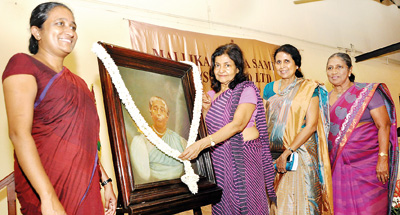News
Dr. Wijemanne hits out at state apathy towards ageing women Mallika Nivasa Samithiya AGM
Vice Chair of the UN Monitoring Committee on the Rights of the Child Dr Hiranthi Wijemanne this week blamed the State authorities for not producing any worthwhile policies to address the issue of ageing women which has got aggravated by migration and the decline of the extended families of the past.

Chief guest Dr. Hiranthi Wijemanne garlands a portrait of the late Mallika Hewavitarne while Mallika Nivasa president Savitri Peiris (second from right), Deputy president Rohini Abeysekera (extreme right) and guest of honour Commissioner of Probation and Child Care, Chandima Dissanayake, look on. Pic by Nilan Maligaspe
Speaking as the chief guest of the Mallika Nivasa Samithiya AGM last Thursday, Dr. Wijemanne said the State has been wanting in this support while civil society organisations were still filling this gap. She said that most elderly women have incomes below the poverty line and less women receive pensions. The risk factor to health and well-being increase with age outlining a string of illnesses they can confront. Outreach services are necessary, she said and pointed out that the founder of the society, Mallika Hewavitarne, mother of the patriot and national leader Anagarika Dharmapala was able to foresee this issue long before the introduction of international Human Rights treaties like the Convention on the Elimination of Discrimination against Women and Children and the Convention on the Rights of the Child.
Referring to children, Dr Wijemanne said that with increasing incidents of domestic violence and continued migration for employment, children experienced greater abandonment. Infanticide is becoming more common and that institutionalizing was occurring not because of lack of parents but the single-mother situation. She said that more and more Sri Lankans overseas want to adopt Sri Lankan babies but complicated adoption laws and lengthy administrative procedures was frustrating this process.
Dr. Wijemanne referred to a grand-nephew of the Anagarika, former Cabinet Minister Gamani Jayasuriya whom she had worked with in the 1980s helping families that were facing the front of terrorism in the villages off Anuradhapura, Polonnaruwa and Trincomalee. “He was indeed a true patriot and loved our country beyond measure,” she said.
Founded by late Mallika Hewavitarne, the mother of Anagarika Dharmapala, the Mallika Home has now become a haven for the poor destitute women who need care. It is now home to 80 elders in residence and they receive total care and protection. The Parakrama child Development Center, also a part of the bigger Mallika society, homes 26 boys between the ages of 5 to 17 and the Sneha Child Development Center accommodates and cares for 18 infant children.
“As I examined the focus of the work of the Samithiya, there are significant social dimensions, not adequately dealt with by the state authorities, but which deserve greater priority,” Dr. Wijemanne who has over four decades of service in Health, Justice and Child Development and Women’s Affaires ministries and also at the National Child Protection Authority and also the Department of Probation and Child Care said.
She explained that these include in improvement of Sri Lanka’s growing numbers of elderly women and abandoned children, both groups that are vulnerable and at great risk of neglect and exploitation, lacking the care, attention and protection they require. The doctor said that the priority placed by the Mallika Nivasa Samithiya and its members, through several decades has responded to their social exclusion, poverty, and injustice and risk of violence, abuse, neglect and abandonment.
Dr. Wijemanne said that the Declaration on Human Rights was adopted and proclaimed by the UN General Assembly in 1948 and that this was the first time that member states of the UN were required to accord to all persons, including children and old persons.
Commissioner of Probation and Child Care Chandima Dissanayake, who was the Guest of Honour at the AGM said the most number of abandoned children are reported from the Western Province with 4600 cases out of Sri Lanka’s total number of 13,000. She said the disappointing news is that there are no houses for these children set up by the state and that if orphanages managed by private groups like the Mallika Nivasa closed down there is no place for these children to go.
The Commissioner added that though there are a large number of abandoned children in the country and an equally convincing number of parents who are willing to adopt these children, the waiting list as high as 2500, they are not moved from the homes or orphanages.
“Because there is at least one parent of the child living, this parent somehow blocks the child from being given for adoption. It is a very sad situation. These children have a promising life with people who are willing to adopt them but their ‘birth certificate’ mothers don’t let them have it and does not even provide for the child themselves,” she said.
The Annual General Meeting of the Mallika Nivasa Samithiya brought together at least 100 women who have joined to provide for the old and young who needed a helping hand. The Samithiya has a membership of over 700 life members.
During the meeting new office bearers were selected. Ms. Savitri Peiris was re-elected as the President, Ms. Rohini Abeysekera was elected as the Deputy President, Vice Presidents elected were Ms. Sriyani Hewavasan and Ms. Prema Weerasighe. Ms. Priyadarshini Rajapakse was re-elected General Secretary and Ms. Chandra de Silva was elected the new Assistant Secretary.

